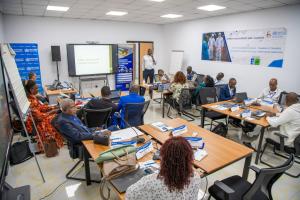Reinforcing expertise in safe and dignified burials during outbreaks
Dakar – In a milestone for regional public health, Dakar hosted its first regional Safe and Dignified Burial (SDB) training, gathering 30 participants from 10 African countries. Organized by the WHO Emergency Hub, the training marks the hub’s emergence as a regional reference centre for strengthening the capacity of national and regional experts in managing public health emergencies. This initiative not only aims to save lives but also to uphold cultural dignity and enhance preparedness against outbreaks of haemorrhagic fevers like Ebola.
The lessons of previous Ebola outbreaks resonate deeply in the workshop. “During the 2014 outbreak, nearly 60% of new infections were linked to unsafe burial practices,” said Dr Thierno Balde, WHO Regional Emergency Coordinator in Dakar. “This training ensures that we don’t repeat history. It’s about protecting lives while respecting cultural traditions.”
Zinedine Kada, the Regional Lead of Operations Support and Logistics (OSL), highlighted his experience during the 2018–2020 Ebola response in the Democratic Republic of the Congo. “We managed training and supervised SDB activities in several districts under challenging conditions. Thanks to the RCCE department's support, RCCE helped communities understand the risks of contamination linked to burials, significantly reducing transmission. Thanks to the joint RCCE and OSL activities, the SDB teams' work has been embraced and accepted by the communities.
Participants engaged in practical exercises, from correctly donning and removing PPE to role-playing real-life burial scenarios. "Safe burials aren’t just a technical task—they’re deeply personal," said Kamal Ait-Ikhlef, WHO’s Health Logistics Team Leader. “When done right, they build trust between health workers and communities. That trust is as essential as any piece of equipment.”
The workshop also explored cultural and emotional dimensions, with discussions led by cultural experts and community leaders. “This training opened my eyes to the importance of engaging communities,” said a participant from Sierra Leone. “We’re not just managing a public health crisis—we’re navigating deeply rooted beliefs and practices.”
By the end of the week, participants are not just equipped with skills—they are part of a growing network of SDB trainers ready to lead in their communities. “This training of trainers is a means for the participants to appropriate and transfer these technical skills linked to SDB activities to limit VHF diseases especially during VHF outbreaks,” noted Zinedine Kada. “The participants will train other staff and transfer this knowledge to all the technical departments concerned in the Ministries of Health of the countries represented here today.”
A Senior Medical Officer from Uganda’s Ministry of Health reflected on the training's impact: "This training has been both timely and transformative. I feel equipped to train colleagues at the national level on safe and dignified burials (SDB) and collaborate with them to cascade these trainings to sub-national levels. It will undoubtedly enhance our preparedness for future outbreaks, which remain unpredictable based on the background that, Uganda has experienced multiple Ebola Virus Disease outbreaks, the most recent being declared in 2022."For the WHO Dakar Hub, this event represents a turning point in building Africa’s regional preparedness. “This is just the beginning,” emphasized Dr. Balde. “We’re building resilient systems and empowering individuals to act as agents of change.”
Dakar’s regional hub is solidifying its role as a key player in public health emergency response, enabling technical capacity building at an unprecedented scale. “This workshop underscores the importance of transforming challenges into opportunities for resilience,” noted Kada.
Thanks to the dedication of these trainers, the fight against haemorrhagic fevers is bolstered, ensuring that safety and dignity remain at the forefront of outbreak responses across Africa.



